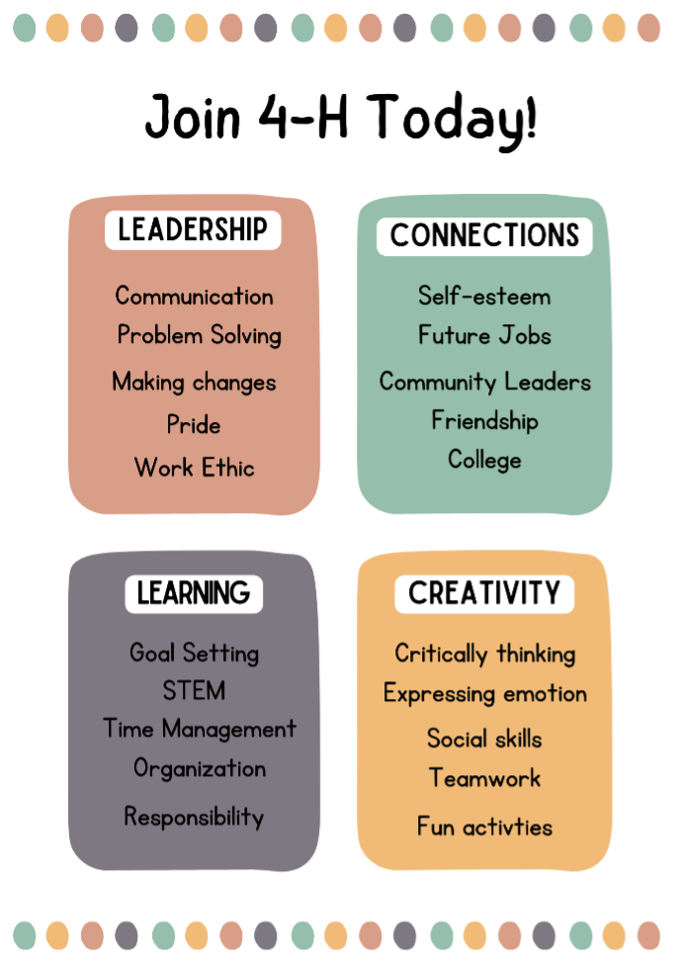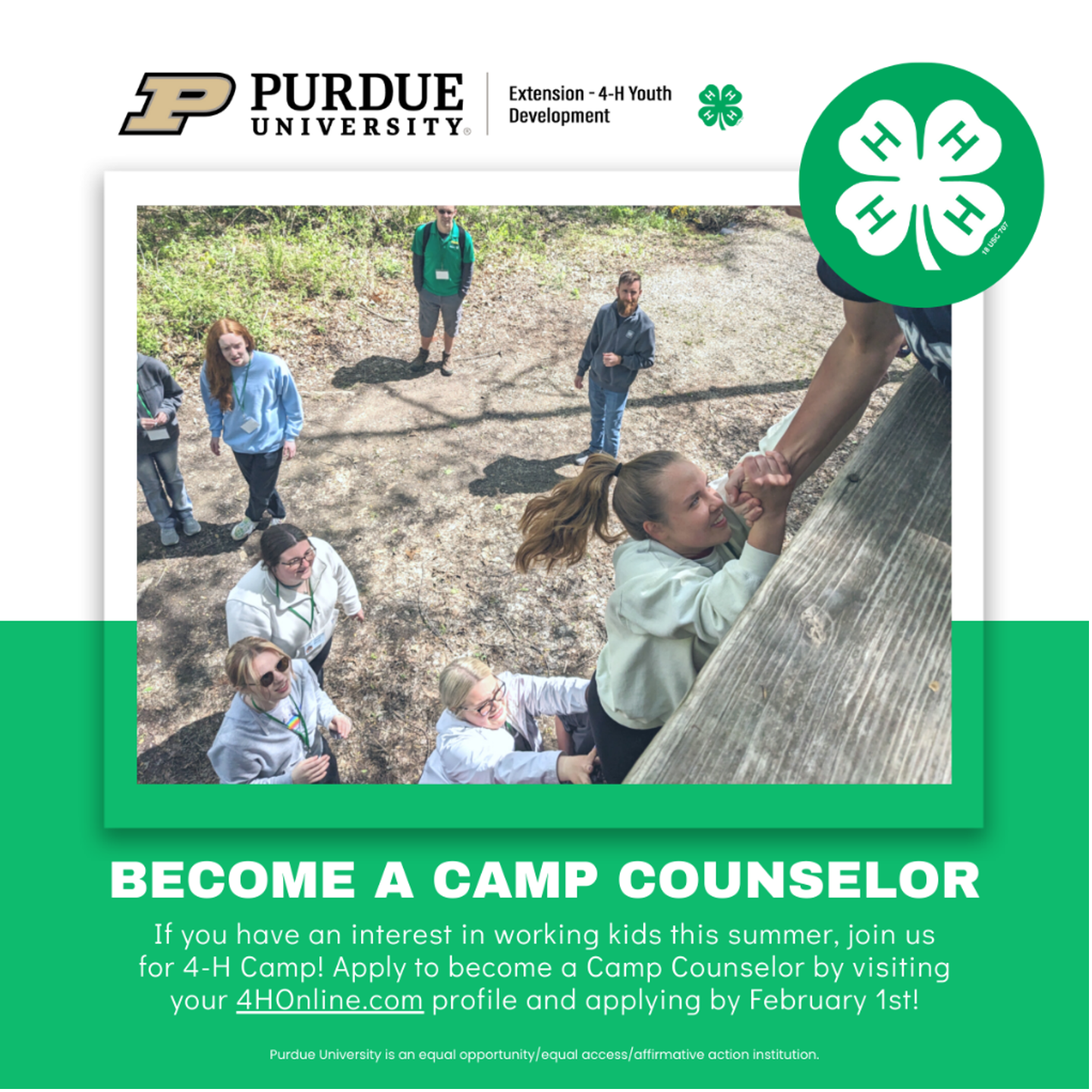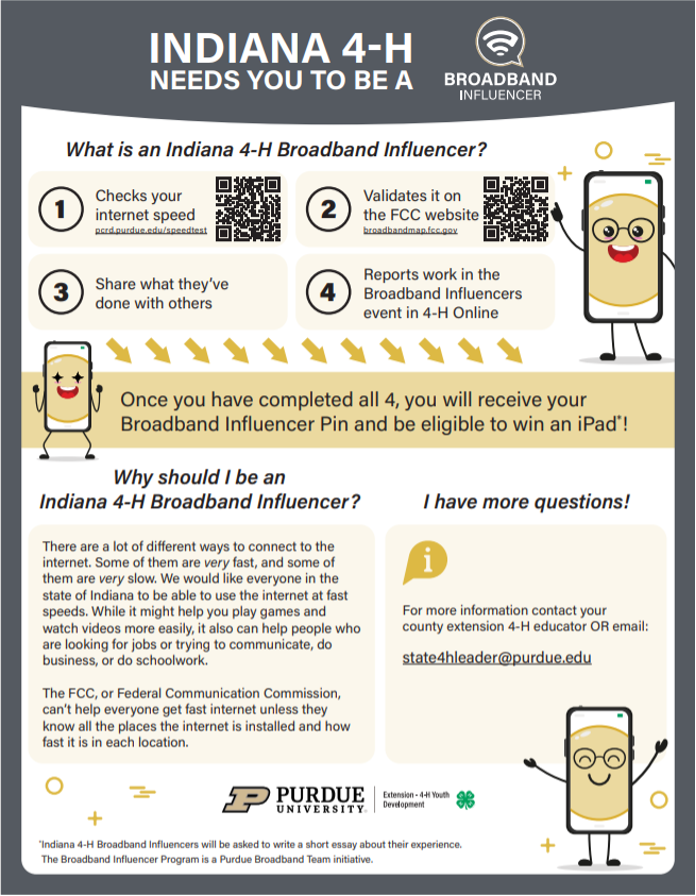4-H
Agriculture
Community
Perry County Extension Newsletter Jan/Feb 2024
4-H Newsletter
Hannah Lasher 4-H Youth Developmenthlasher@purdue.edu
It’s Time to Enroll in 4-H for 2023!


Volunteers need to complete all of the training modules to complete their reenrollment. This is to be completed before working with youth or serving on 4-H committees and boards. The modules can be completed separately. The total time to complete all of the trainings is about one hour. Please complete this training online before the end of 2023. If you need assistance with the training or prefer an in-person training, contact the Extension office. Evening appointments can be scheduled. While I hope that you will reenroll for another year of serving youth, if you are unable to do this or would like to switch to a different role, please let me know.
4-H’ers are asked to reenroll as soon as possible so that you don’t miss out on any opportunities. While the youth enrollment window is Oct. 1-Jan. 15, it is best to enroll early. You don’t need to know all of the projects that you are taking when you enroll. Sign up for the ones you are most likely to take, and you can add and delete projects until May 15.
4-H Open House Recap
Perry County Extension hosted a 4-H open house in order to meet the new 4-H Youth Development Extension Educator. The open house included a bonfire where hot dogs, apple cider and s’mores were available to roast over the fire. 38 people came out to this event. It was a great evening of meeting the 4-H families and leaders. There were several projects on display in case new youth wanted to see some examples of past projects that were at the previous year’s 4-H Fair. It was a great event to get the community excited about 4-H and enjoy the nice fall weather before it gets too chilly!
We would like to give a big thanks to all the volunteers and 4-Hers that showed up to this event and brought the demonstrations! It is going to be a fun year for Perry County 4-H! Encourage friends this year to join 4-H; so, we can all have fun at events like these.
4-H Scholarships
4-H’ers in grades 10-12 are encouraged to apply for Indiana 4-H Foundation scholarships. Applications should be submitted prior to the January 25 deadline to allow time for revisions. These scholarships require an application process separate from the ones provided at school. Contact Hannah Lasher for assistance and to schedule an individual help session. Information and applications are posted here: https://extension.purdue.edu/4-H/get-involved/scholarships.html***Perry County 4-H’ers***
New name for the Newsletter!
Attention Perry County Youth! Send your suggestions for the name for the newsletter and the winner will receive a prize from the extension office! Email your suggestions to Hlasher@purdue.edu


Perry County Ag News

Sara Dzimianski
ANR Extension Educator
(812) 547-7084
Educator’s Corner
Winter is here, even if some days it doesn’t feel like it. The National Weather Service is predicting a warmer than average winter for our area, with equal chances of above or below average participation due to El Niño conditions. As normal for our region, we will likely experience significant temperature and moisture fluctuations due mainly to the Arctic Oscillation.
Temperature and moisture swings are very stressful to livestock and can make livestock more susceptible to diseases such as pneumonia. Ensure that livestock have adequate shelter and ventilation within that shelter and monitor regularly.
Leafy green vegetables started in the fall can be kept alive through winter conditions by row covers or low tunnels. This can provide produce all winter long if well-managed.
Clean up dead plant materials from last summer’s garden and dispose of them well away from garden areas to prevent the transmission of diseases from one year to the next. Winter is a great time to clean and sanitize garden tools, and prepare them for the spring growing season. Prune summer-flowering shrubs and trees during dormancy, as well as fruit trees and bushes. Keep up activity as you rest for the winter.
-Sara
One Good Idea Shop Talks and Mini-Grant Opportunity
Source: Conservation Cropping Initiative Newsletter
We’re excited to share a multi-state effort targeted at increasing edge-of-field conservation practice adoption. Several land-grant universities in the Midwest and Mid-South have partnered to launch a meet-up series and mini-grant program.
Good Idea Shop Talks
This free meet-up series is for row crop and livestock producers who want to exchange ideas and advice for troubleshooting on-farm challenges related to improving soil and water resources. It will help producers connect with and learn from each other about how to be good stewards while protecting their profitability. Our first season of these weekly, virtual meet-ups will take place on Thursdays, January 18th and 25th, and February 1st at 11:30am CT / 12:30 ET. Learn more and register at: https://goodideafarm.org/shop-talks/
Good Idea Mini-Grants
We invite pairs of producers and farm advisors to submit proposals to implement a low-cost edge-of-field conservation practice on the producer’s operation and create a video or podcast about what they did and learned to be shared with other producers via One Good Idea. Awards are up to $8,000. The application deadline is January 15th, 2024. Learn more and apply at: https://www.reach.msstate.edu/grant-application.php
Forest Management Course Offered for Private Woodland Owners
By: Ron Rathfon, Purdue Extension Forester & Kenneth J. Eck, Purdue Extension - Dubois County
Conservation Districts Regional Forestry Committee is offering a workshop for those interested in the proper management of private woodlands and forests.
The “Forest Management for the Private Woodland Owner” series will run eight consecutive weeks on Monday evenings from February 5 through March 25, 2024 from 6-9 PM EST (except for Saturday morning field trip, which will run from 9 -12 AM), at the Southern Indiana Purdue Agricultural Center (SIPAC), 11371 E. Purdue Farm Road, Dubois, IN. Ron Rathfon, Purdue Extension forester; Purdue Extension staff; and state and private sector foresters will be the instructors for this event.
Course topics include forest resources and identification, biology and ecology, forest cultivation, managing woodland investments, timber marketing, wildlife management, and assistance for landowners. A field trip will also be included in the course. Class size is limited to 40 registrants on a first-come, first-serve basis.
The registration fee is $50 per person, or $30 per person for couple/family sharing materials. Required registration form and course brochure are available at:
https://extension.purdue.edu/county/dubois/forestry-short-course-brochure-2024.pdf . For more information about the workshop, contact Ron Rathfon at 812-678-5049, ronr@purdue.edu .
Writers: Ron Rathfon, 812-678-5049, ronr@purdue.edu and Kenneth Eck, 812-482-1782, kjeck@purdue.edu .
Save the Date!
March 8-9 Homesteading Conference
Friedman Park, Newburgh, IN
March 8
Hands-on Food Preservation Workshop
March 9
Full day of classes and demos on various small farm topics including:
- Beekeeping
- Organic gardening
- Backyard poultry production
- Small business tools
- On-farm butchering
- Soil health
- Home fruit production
- Small farm/garden equipment
- Youth program for grades K-6
USDA Releases Updated Plant Hardiness Zone Map
By: John Woodmansee, ANR Extension Educator, Whitley County
The United States Department of Agriculture (USDA) recently released its updated Plant Hardiness Zone Map.
The USDA Plant Hardiness Zone Map uses weather data to map average annual extreme minimum temperatures (winter lows) over a recent 20-year period. The most recent release covers weather data from 1991-2020. The previous version, released in 2012, covered weather data from 1976-2005. Read more.
2024 Perry County Soil and Water Conservation District Annual Meeting
Tuesday, January 30
6:30 p.m.
Bristow Community Center
20569 Huffman Mill Rd., Bristow
Speakers: Abby Heidenreich /Topic: Farm Stress
Future Farmers of America
Pork Chop Dinner by New Boston Tavern
Adults $5.00
Children 12 & under $3.00
Reservations are Due 4:00 pm - Friday, January 12
For reservations phone: 812-547-4686 Email: darlene-fischer@iaswcd.org
Health & Human Sciences
Bringing University information to the local level to strengthen families, spend smart, eat right, and live well.

Megan Jaspersen Health and Human Sciences Educator Purdue Extension
Perry County Office 65 Park Ave Tell City, IN 47586 812-547-7084
Use the Upcoming New Year as a Time for Reflection
Take a few minutes to reflect on 2023. Write down your “Top 10” highlights. List five disappointments. What were 3 game changers in your life? Now let’s look forward to an abundant 2024. Choose 3 areas of your life that you want to focus on. Where do you want to see yourself at this time next year and how are you going to make it happen? Will you enroll in a class? Start an exercise program? Begin a new business? Seek out new people and new places? Check something off your bucket list? It’s up to you. You can wish for it to happen, or you can take steps to make it happen.
One way to make your dreams or goals happen is to begin by writing an affirmation. In a blog on Powerful Affirmations, Michele Hays shares this: Affirmations are positive, specific statements that help you visualize, and believe in, what you're affirming to yourself, helping you to make positive changes to your life. Typically, affirmations are written on a regular basis or repeated over and over again either aloud or in the mind. This may be done as a part of prayer, meditation, or while taking a walk or doing chores.
Research finds affirmations work very well for some and not so well for others. Try looking at positive affirmations this way – many of us do repetitive exercises to improve our body's physical health. Affirmations are like exercises for our mind, emotions and outlook on life. These positive repetitions can reprogram our thinking patterns so that, over time, we begin to think, and act, in a new way. For examples of positive affirmations check out author and long-time proponent of the use of affirmations, Louise Hay's website: http://www.louisehay.com/affirmations/ . Source: (https://extension.illinois.edu/blogs/refill-your-cup-self-care/2017-04-25-power-affirmations )
Meet the Newest Member of the Purdue Extension - Perry County Team

We are thrilled to announce that Purdue Extension has a new helper in the HHS Department. Ella Paige was born to HHS Educator Megan and her husband Joey on August 10th weighing in at 9lbs 3oz. Her big sisters Lilly and Leah are great helpers, and Ella is fitting right in with this girl tribe! Thank you for your patience as they enjoyed some time together at home this fall. Megan is back to work and excited to continue to provide our community with education related to food, family, money, and health. If you catch Ella snoozing on the job, be sure to let us know!
Traveling this Winter? Tips for Safety

- Adjust following distance and speed in snowy or icy conditions.
- Having a few drinks while you are out? Be sure to designate a sober driver or arrange for a rideshare service like Uber or Lyft ahead of time if you plan to consume alcohol of any kind.
- Avoid aggressive and angry driving.
- During the winter months, an earlier sunset means you've got less daylight to work with. Ideally, plan your trip to avoid driving at night.
- Cold weather takes its toll on car batteries. Double-check to make sure you've got jumper cables in your trunk. You never know when an easy jump-start could save you time and hassle — or when you could use them to help someone else.
- A winter storm can leave you stuck in a drift or stranded in a blizzard, particularly if you're traveling on unfamiliar roads. So be sure to stock your vehicle with items that might be helpful in case of a problem: thick blankets, extra food and water, coats and jackets and a flashlight.
Diabetes Myths

Diabetes is a complex disease. You may have heard conflicting theories on what causes it, how it is diagnosed, and how it is managed. If you are affected by diabetes, you will want the truth. Below are some common myths that you may have heard. Please contact the office for more information on diabetes and upcoming programs.
- There is no diabetes in my family, so I don’t have to worry. Diabetes does run in families, but many people diagnosed with the disease have no close family members who have it. Lifestyle, heredity, and possible other factors, such as certain viruses, may increase the risk.
- It’s called sugar diabetes, so it must come from the sugar I eat. When you eat food, the body turns it into a form of energy called glucose, also know as “blood sugar.” Insulin helps move the blood sugar into your body’s cells for energy. When the body’s own insulin does not work well or when not enough insulin is made, the blood sugar rises. Then the person has diabetes.
- My friend takes insulin pills to control her diabetes. Insulin is a protein; it cannot be taken by mouth because the stomach would not digest it. Insulin must be given by injection or insulin pump through the skin. Diabetes pills help by making the body produce more insulin, use its own insulin better, produce less blood sugar from the liver, or limit carbohydrate absorption after a meal.
- If I don’t take diabetes medicine, my diabetes must not be serious. Not everyone who has diabetes takes diabetes medicine. If the body produces some insulin, weight loss, healthy eating, and regular physical activity can help insulin work more effectively. However, diabetes does change over time, and diabetes medicine may be needed later.
- If I have diabetes, I will never be able to eat any sugar. To control one’s blood sugar, all sources of carbohydrates must be controlled. Carbohydrates include starchy foods like pasta and bread as well as sugary foods like cakes or candy. Even juice, milk, and fruit all contain carbohydrates, so they must be eaten in moderate amounts. With careful planning, small amounts of sugar can replace other carbohydrates usually eaten in a meal. Too much sugar is bad for everyone. If only provides empty calories.
- I have diabetes, and I’ve seen its effect on family members. I know there is nothing I can do about it. Remember diabetes is serious, common, costly, and CONTROLLABLE. There are many things diabetics can do to live a full life, while preventing or delaying complications. Control your diabetes by eating healthy foods, staying active, lose weight if needed, take medicine as prescribed, test your blood sugar, and see your health care team regularly. Source: National Diabetes Education Program- https://www.cdc.gov/diabetes/ndep
"MAKING THE HEALTHY CHOICE, THE EASY CHOICE.”
ERIN MEYER, RDN - COMMUNITY WELLNESS COORDINATOR
Do I Qualify for SNAP?
To qualify for the Supplemental Nutrition Assistance Program, applicants must meet certain non-financial and financial requirements. Nonfinancial requirements include state residency, citizenship/alien status, work registration and cooperation with the IMPACT (job training) program. Financial criteria include income and asset limits. The asset/resource limits are $5,000 for most households.
Assets include bank accounts, cash, real estate, personal property, vehicles, etc. The household's home and surrounding lot, household goods and personal belongings and life insurance policies are not counted as assets in the SNAP program. All households (except those with elderly or disabled members) must pass a gross income test (130% of poverty) to qualify for SNAP benefits. The gross income is per household size and based on the gross monthly income received by all household members. For more information, please visit: https://www.in.gov/fssa/dfr/snap-foodassistance/do-i-qualify-for-snap/
HAPPY NEW YEAR!!!!
Raise Healthy Eaters in the New Year
Ring in a new year by teaching kids the importance of food, nutrition and eating skills: food to fuel busy, successful lives; nutrition to nourish strong bodies and smart brains; and eating skills to enjoy the social aspect of meals with family and friends.
As with any part of raising children, no one does a perfect job with nutrition. As a parent, grandparent or adult caregiver, you can help to raise healthy eaters during these critical years by doing your best to:
- Serve regular, balanced meals and snacks with a variety of nutrient-rich foods. Provide calm, pleasant meal times where adults and children can talk together.
- Remove distractions such as television, phones and tablets so that your attention is on each other.
- Allow children to use their internal signals to decide how much and what to eat from the foods you set out for each meal.
- Explore a variety of flavors and foods from different cultures and cuisines.
- Share an appreciation for healthful food, lovingly prepared and shared with others.
- Make food safety, such as washing hands, part of every eating occasion.
- Teach basic skills for making positive food choices away from home.
- Find credible food and nutrition resources when you don't know the answer.
- Make Family Meal Times a Priority
Sometimes a very simple act can have important, long-lasting benefits. According to parenting and health experts, that is exactly the case with family meal times. Eating and talking together helps to:
- Foster family unity
- Prevent behavior problems at home and school
- Enhance academic success
- Improve nutrition
- Promote healthy weight for kids
With that impressive list of benefits, it's worth making the time and effort to enjoy more family meal times each week. Look for easy ways to add just one family meal to the schedule. If evenings seem too hectic for family dinners, set aside time for a weekend breakfast or lunch. After a month or two of this new pattern, you can add another family meal each week. Before you know it, you will be eating together on most days.



